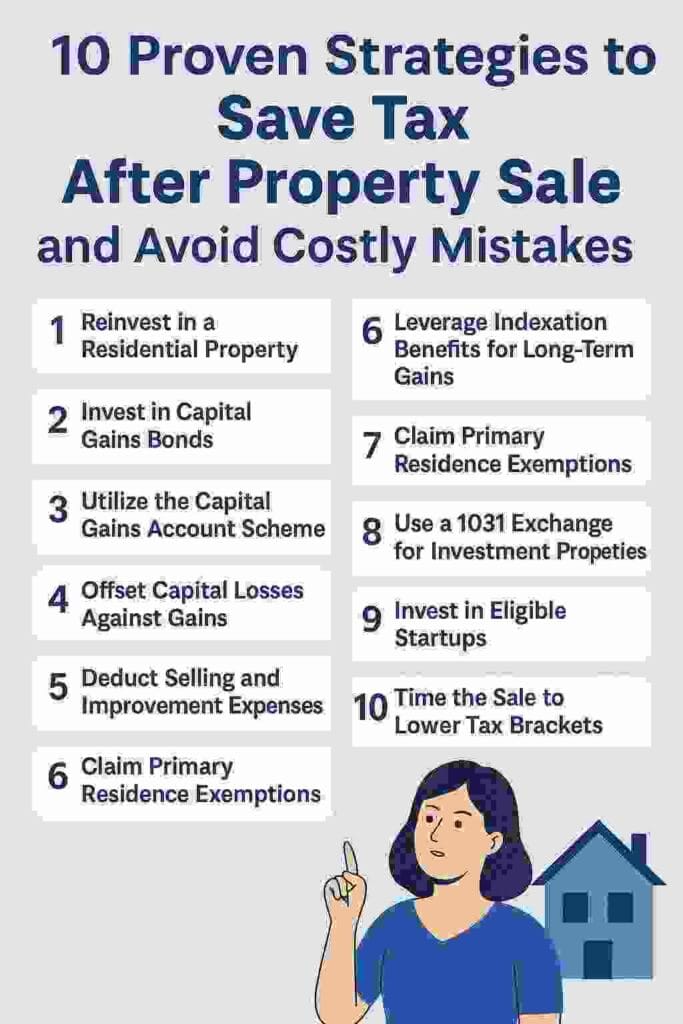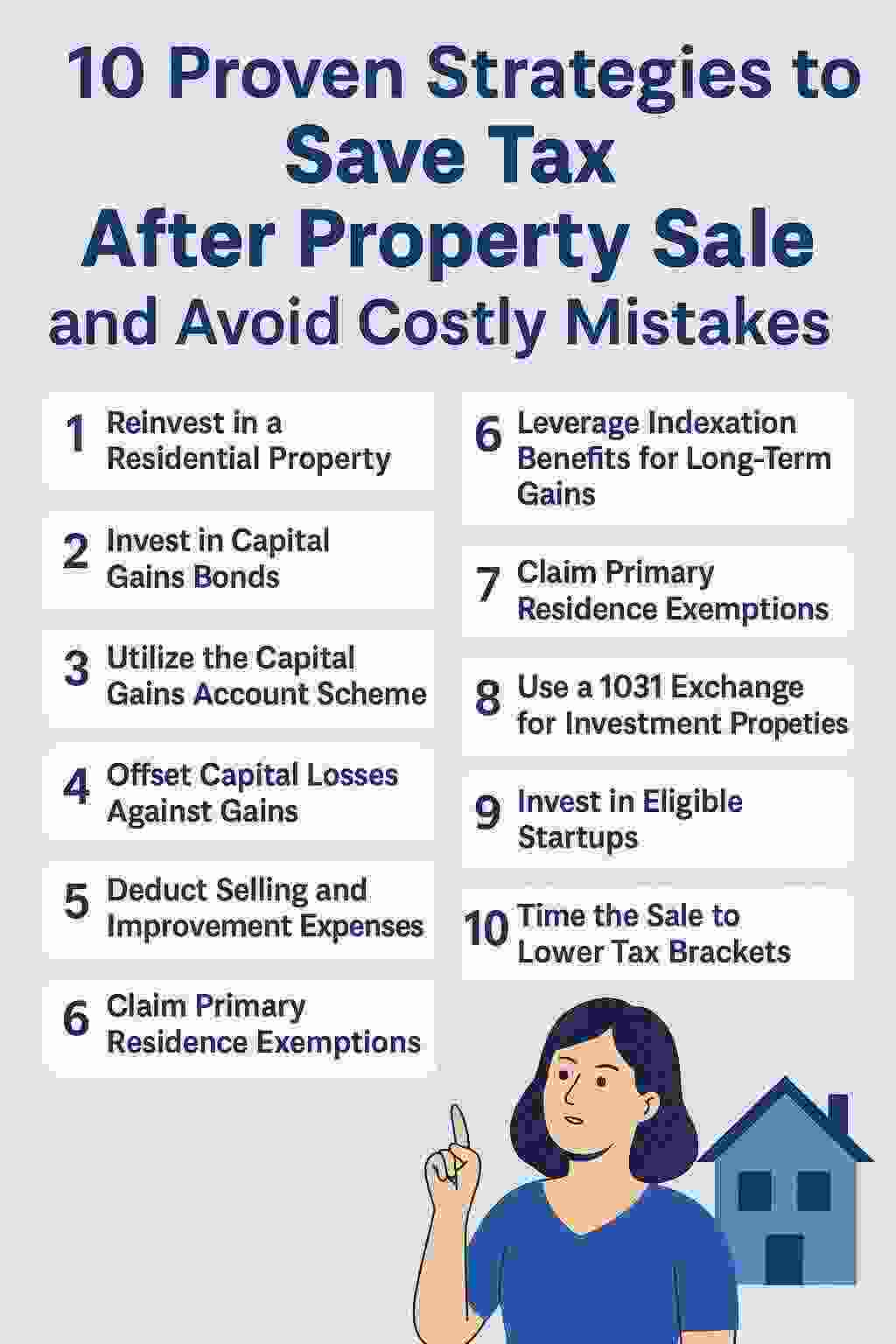Discover 10 expert-backed strategies to Save Tax After Property Sale. Reduce capital gains tax with smart investments and exemptions. Maximize your profits now! #Save Tax After Property Sale, #how to save tax after selling property, #capital gains tax exemption property sale, #tax saving tips after selling house, #section 54EC bonds, #reinvest property sale money, 1#031 exchange tax deferral, #primary residence tax exemption

Introduction: Keep More of Your Profits with Smart Tax Strategies
Selling a house is a big financial accomplishment, but if you’re not ready, an impending capital gains tax can dramatically reduce your winnings. The good news? You can legally Save Tax After Property Sale by employing calculated, expert-approved techniques. Your tax payment can be reduced or eliminated in a number of ways, regardless of whether you sold a family home, a rental property, or a piece of land. We’ll go over 10 tried-and-true methods in our extensive guide to save tax after property sale, which will help you stay out of trouble and keep more of your hard-earned cash. These strategies, which range from borrowing government-backed bonds to reinvesting in real estate, will enable you to easily handle tax complexity. Let’s explore how you can safeguard your financial future and save tax after property sale!
Understanding Capital Gains Tax on Property Sales
Before exploring how to Save Tax After Property Sale, it’s essential to understand capital gains tax. A capital gain is taxable when the profit from the sale of a property exceeds the acquisition price. The categories of capital gains are:
- Short-Term Capital Gains (STCG): For assets held for less than 24 months, short-term capital gains (STCG) are taxed at the rate of your income tax slab.
- Long-Term Capital Gains (LTCG): Taxed at a reduced rate (e.g., 12.5% in certain jurisdictions, with indexation benefits) on properties held for more than 24 months.
10 Proven Strategies to Save Tax After Property Sale
Reinvest in a Residential Property (Section 54 Exemption)
Reinvesting your capital gains into another residential property under Section 54 (or comparable provisions in other tax codes) is one of the best strategies to save tax after property sale. LTCG is exempt from selling residential properties that have been held for more than 24 months.
- How It Works: To avoid paying LTCG tax, reinvest the whole capital gain in the acquisition or building of a new residential property within two or three years.
- Example: Sarah made $120,000 when she sold her house for $500,000. She was able to save money on taxes after selling her property by reinvesting $120,000 in a new home.
- Tip: Make sure the new property is timely and registered in your name.
Invest in Capital Gains Bonds (Section 54EC)
If buying another property isn’t feasible, Section 54EC bonds offer a secure way to Save Tax After Property Sale. When purchased within six months, these government-backed bonds—which are issued by organisations such as the Rural Electrification Corporation or the National Highways Authority—are immune from LTCG.
- How It Works: Purchase bonds up to a predetermined amount (such as $50,000). The bonds have a five-year lock-in term, however the invested cash is tax-exempt.
- Example: Vikram saved $8,750 (at a 12.5% LTCG rate) after selling a house for a $70,000 profit and investing the proceeds in 54EC bonds.
- Tip: Perfect for cautious investors looking for low-risk investments.
Utilize the Capital Gains Account Scheme (CGAS)
The Capital Gains Account Scheme (CGAS) is a flexible solution to Save Tax After Property Sale if you plan to reinvest in a property but need time to find the right one.
- How It Works: Before submitting your tax return, deposit your capital gains into a CGAS account at a recognised bank. To qualify for the exemption, use the money to purchase or build a residential home within two to three years.
- Example: Priya was able to save tax after selling her property by putting her $60,000 gain into a CGAS account and using it to purchase a house.
- Tip: After the deadline, unused money is subject to taxes.
Offset Capital Losses Against Gains
You can Save Tax After Property Sale by offsetting capital gains with losses from other investments, such as stocks, mutual funds, or another property.
- How It Works: In the same fiscal year, subtract capital losses from gains. For a maximum of eight years, excess losses may be carried forward.
- Example: Anil made $50,000 when he sold a home, but he also lost $15,000 on his stocks, which reduced his taxable gain to $35,000 and helped him save money on taxes after the sale.
- Tip: Carefully record losses for tax purposes.
Deduct Selling and Improvement Expenses
Lower your taxable capital gains to Save Tax After Property Sale by deducting expenses related to the sale and property improvements.
- How It Works: Take the sale price and deduct expenses such as advertising, legal fees, broking fees, and capital improvements (like renovations).
- Example: Meena made $250,000 for a property, which she sold for $400,000. She was able to Save Tax After Property Sale by reducing her taxable gain to $125,000 after deducting $10,000 for broking and $15,000 for improvements.
- Tip: Save all of your receipts.
Leverage Indexation Benefits for Long-Term Gains
For properties held over 24 months, indexation is a powerful tool to Save Tax After Property Sale by adjusting the purchase price for inflation, reducing taxable LTCG.
- How It Works: The indexed cost of acquisition is determined using the Cost Inflation Index (CII). Taxation only applies to the gain over this cost.
- Example: The taxable gain is reduced to Save Tax After Property Sale when a property sells in 2025 for $142,913 after being purchased for $100,000 in 2015 (CII: 254).
- Tip: Indexation is exclusive to LTCG.
Claim Primary Residence Exemptions
Selling your primary residence may qualify for a significant tax exemption, helping you Save Tax After Property Sale.
- How It Works: In certain jurisdictions (like the United States), you can deduct up to $250,000 (for single people) or $500,000 (for married people) in gains if you have lived in the property as your principal residence for two of the previous five years.
- Example: After three years of residence, a couple sold their house for a $450,000 profit, minus the full gain to Save Tax After Property Sale.
- Tip: Check local tax rules to confirm eligibility.
Use a 1031 Exchange for Investment Properties
For investment or rental properties, a 1031 exchange (common in the U.S.) allows you to defer taxes, helping you Save Tax After Property Sale.
- How It Works: Within 180 days, reinvest the full sale proceeds through an authorised intermediary into a like-kind investment property.
- Example: John deferred all taxes during the $600,000 sale of a rental property and invested the proceeds in another rental.
- Tip: Strict regulations necessitate expert support.
Invest in Eligible Startups (Section 54GB)
A creative way to Save Tax After Property Sale is to invest capital gains in eligible startups under Section 54GB or similar provisions.
- How It Works: If a startup satisfies certain requirements (such as being in a recognised industry), invest profits in its shares within six months. The amount invested is not subject to taxes.
- Example: Lisa postponed her tax obligation to Save Tax After Property Sale by investing $40,000 of her proceeds in a computer business.
- Tip: Start-ups are riskier, so do your research.
Time the Sale to Lower Tax Brackets
Strategically timing your property sale can Save Tax After Property Sale by aligning with a lower-income year, reducing your tax rate.
- How It Works: STCG (taxed at your income rate) or LTCG are in a reduced tax bracket if you sell during a year when your income is lower.
- Example: Mark was able to save money after selling his property by delaying his sale until a low-income year, which lowered his STCG tax rate from 30% to 20%.
- Tip: Needs planning and income predictions.
Common Mistakes to Avoid When Trying to Save Tax After Property Sale
To maximize your ability to Save Tax After Property Sale, avoid these pitfalls:
- Missing Deadlines: There are stringent deadlines for exemptions such as Section 54EC (6 months) and CGAS (2–3 years). Gains are taxable if they are missed.
- Poor Documentation: To reduce taxes after selling a property, keep track of all expenditures, contracts, and investments for audits.
- Ignoring Professional Advice: Because tax regulations are complicated, a tax expert can help you save money on taxes after selling your property.
Conclusion: Secure Your Financial Future with Smart Tax Planning
Although selling a house is a fantastic way to increase your wealth, taxes might reduce your gains if you don’t plan ahead. By implementing these 10 proven strategies to Save Tax After Property Sale, from reinvesting in property to leveraging 1031 exchanges, you can significantly reduce or eliminate your tax liability. To customise these strategies to your requirements, take quick action, keep thorough records, and speak with a tax expert. Start utilising these strategies right now to Save Tax After Property Sale and create a more secure financial future to avoid having taxes reduce your benefits!
FAQs
Q1: How can I Save Tax After Property Sale without buying another property?
To postpone taxes while making future investment plans, purchase Section 54EC bonds within six months or place profits in a CGAS account.
Q2: What constitutes a property’s long-term capital gain?
LTCG, which offers reduced tax rates and indexation to Save Tax After Property Sale, is applicable to properties held for more than 24 months.
Q3: After selling a property, can I deduct renovation expenses to save money on taxes?
Indeed, your taxable gain may be lowered by capital improvements like remodelling and selling costs (like broking).
Q4: What occurs if I don’t utilise my CGAS monies by the due date?
Your ability to Save Tax After Property Sale is diminished since unused funds are subject to capital gains tax in the year the deadline passes.
Q5: Are all types of properties eligible for a 1031 exchange?
No, it usually applies to rental or investment homes rather than primary residences and necessitates rigorous adherence to the Save Tax After Property Sale rule.
Disclaimer
This page is not a replacement for expert tax advice; rather, it offers general information. Jurisdiction-specific tax regulations are subject to change. To guarantee compliance and maximise your plan to save taxes after selling your property, speak with a knowledgeable tax expert.
Also Read:
- Rent vs Buy Decision in 2025: Making the Right Choice at the Right Time
- Real Estate Returns in 2025: Myth vs Reality Explained for Smart Investors
- April 2025: The Perfect Time for Real Estate Investment in India
- Second Home Investment Tips: 5 Critical Factors to Know Before Buying
- Sold property and want to save tax? This tax expert suggests a smarter way

